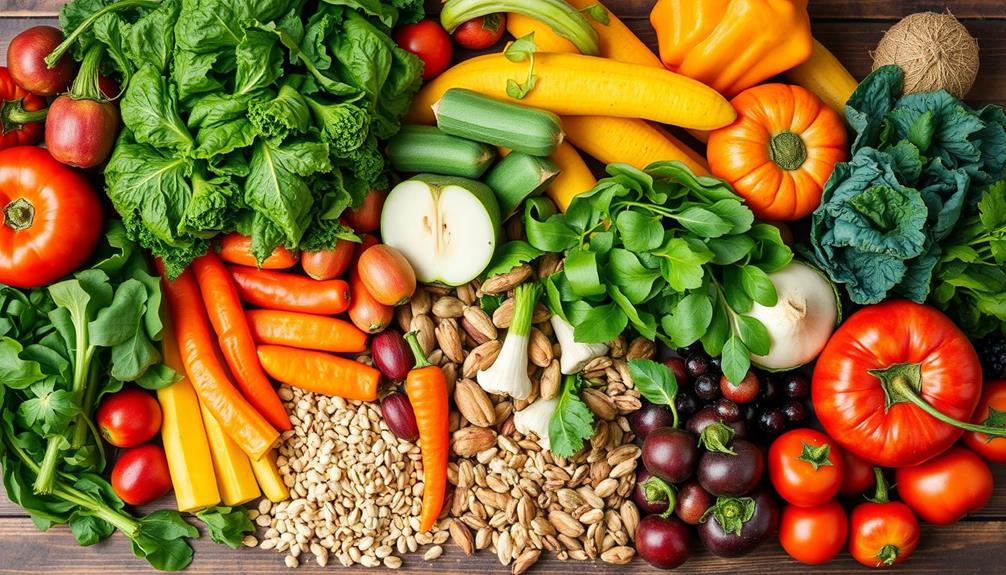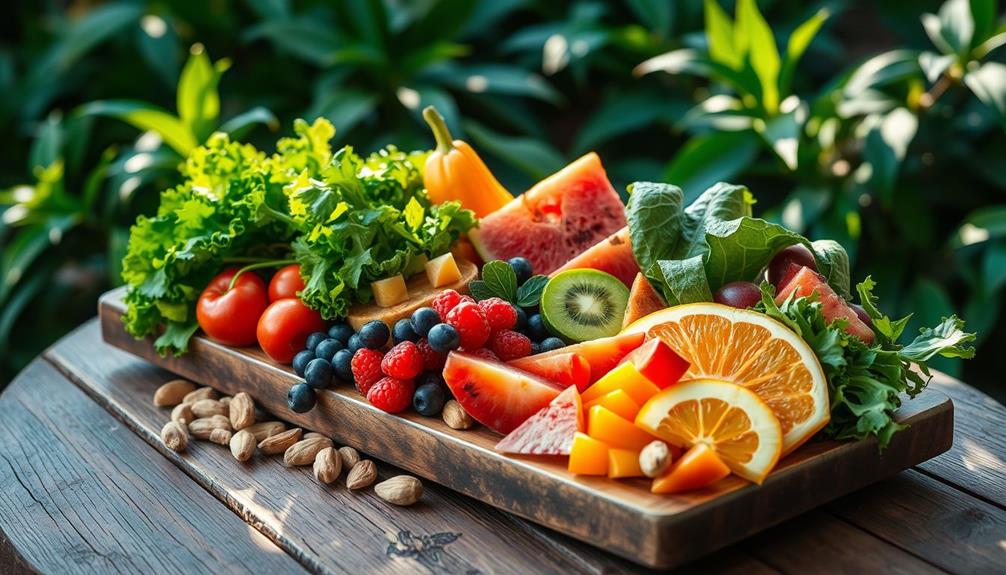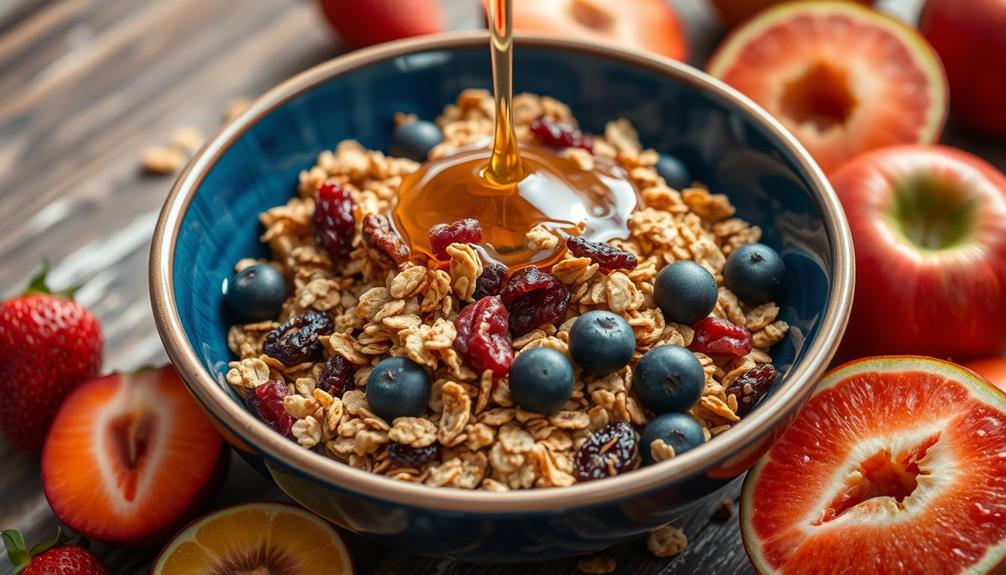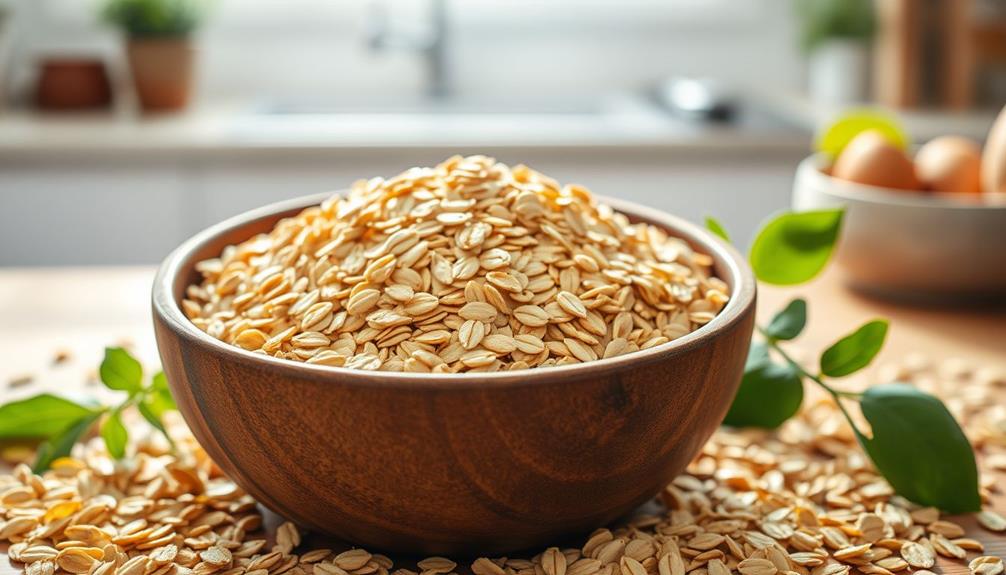You might find people eat raw food for several compelling reasons. Many believe it preserves essential nutrients and enzymes lost during cooking, enhancing overall health. Raw diets can reduce chronic disease risks and improve digestion due to their high fiber content. Plus, they often prioritize local, seasonal produce, aligning with sustainable practices. You might also hear testimonials about increased energy and clearer skin from those committed to a raw food lifestyle. However, there are challenges, like ensuring adequate nutrient intake. There's much more to explore about the benefits and considerations of going raw. Raw food digestion facts are important to consider when deciding to adopt a raw food diet. Some people find it takes time for their bodies to adjust to the high fiber content, leading to initial discomfort. Additionally, certain raw foods may be difficult to digest for some individuals, such as cruciferous vegetables. It’s crucial to educate oneself on proper food combining and preparation techniques to support optimal digestion and nutrient absorption. These factors highlight the complexity of raw food diets and the need for thorough research before making the transition.
Key Takeaways
- Many people adopt raw food diets to preserve vital nutrients and enzymes that are often lost during cooking.
- Raw foods are rich in essential vitamins, antioxidants, and fiber, promoting overall health and reducing chronic disease risks.
- Adherents often report increased energy levels, improved digestion, and clearer skin as benefits of consuming raw foods.
- Ethical and environmental considerations, such as animal welfare and sustainability, drive individuals towards raw food choices.
- Online communities offer support and shared experiences, motivating individuals to pursue and maintain a raw food lifestyle.
Overview of Raw Food Diets
When it comes to raw food diets, you're diving into a way of eating that emphasizes unprocessed and uncooked foods, typically keeping temperatures between 104°F and 118°F. This approach focuses on preserving vital nutrients and enzymes that can be lost during cooking.
It's significant to note that many raw foods, like fruits and vegetables, are rich in antioxidants and beneficial for overall health, similar to the qualities found in cranberry juice consumption. You'll find various variations of the raw food diet, including raw vegan, which consists solely of plant-based foods, and raw vegetarian, which allows eggs and dairy. There's even a raw omnivorous option that includes raw animal products.
Staples in your raw food diet will often include fruits, vegetables, nuts, seeds, and sprouted grains. It's imperative to be aware that some foods, like kidney beans and cassava, need cooking to avoid toxicity.
The appeal of eating raw foods often lies in their nutrient-dense nature. Many proponents believe that following a raw food diet can lead to significant health benefits, such as weight loss and improved digestion.
However, it's vital to plan your meals carefully to guarantee you're getting adequate intake of essential nutrients, including protein, vitamin B12, iron, calcium, and omega-3 fatty acids.
Health Benefits of Raw Foods

Embracing a raw food diet can lead to numerous health benefits that enhance your overall well-being. By incorporating raw fruits and vegetables into your daily meals, you're consuming foods rich in essential nutrients, vitamins, and antioxidants that cooking often diminishes. This nutrient density is linked to a reduced risk of chronic diseases like heart disease, diabetes, and obesity, thanks to the high fiber and low-calorie content of raw foods.
Additionally, a raw food diet emphasizes the consumption of local and seasonal produce, which contributes to sustainability and reduces your carbon footprint by aligning with sustainable practices.
In addition, the enzymes naturally found in raw foods can aid in digestion and improve nutrient absorption, which supports your overall digestive health. Many who adopt a raw food diet report noticeable benefits, such as increased energy levels, improved skin clarity, and better digestion.
Furthermore, studies suggest that a raw food diet may help lower cholesterol and triglyceride levels, promoting cardiovascular health. By choosing raw foods, you not only nourish your body with wholesome nutrients but also take proactive steps toward a healthier lifestyle.
Nutritional Considerations

When you choose a raw food diet, you're boosting your intake of nutrient-dense fruits and vegetables, which can lower your risk of chronic diseases.
Incorporating a variety of foods can also enhance your overall health, including supporting functions like oral health with natural remedies, such as essential oils for toothache relief.
However, you need to be mindful of essential nutrients like vitamin B12 and iron, as they may be harder to get from uncooked sources.
Balancing these benefits with the challenges is key to making the most of your raw food journey.
Nutrient Density Benefits
Focusing on nutrient density, raw food diets provide a wealth of health benefits by emphasizing fresh fruits, vegetables, nuts, and seeds. These foods are rich in vitamins, minerals, and antioxidants, essential for maintaining overall health. Raw diets preserve natural enzymes, which can aid digestion and enhance nutrient absorption. This is vital for supporting metabolic functions and promoting digestive health.
Here's a quick look at some of the benefits of a raw food diet:
| Nutrient | Benefit | Source |
|---|---|---|
| Vitamins | Supports immune function and overall health | Fruits and vegetables |
| Minerals | Essential for bone health and metabolic processes | Nuts and seeds |
| Antioxidants | Reduces inflammation and oxidative stress | Colorful fruits and veggies |
| Fiber | Improves digestive health and lowers cholesterol | Whole fruits and veggies |
| Weight Management | Aids in maintaining a healthy weight | Low-calorie raw options |
Essential Nutrient Challenges
A raw food diet, while packed with benefits, can present several significant nutrient challenges that require careful attention. One major concern is the potential for nutrient deficiencies, particularly in vitamin B12, iron, calcium, and omega-3 fatty acids. Since cooking food enhances the bioavailability of certain nutrients, you might find it harder to absorb these vital nutrients from raw sources alone.
Additionally, it's important to take into account cold medications overview when focusing on overall health and nutrition, as certain medications can impact nutrient absorption.
If you're following a strict raw food diet, you may struggle to meet your caloric needs, leading to unintended weight loss and fatigue. This makes it important to plan your meals thoughtfully to guarantee you're consuming enough calories and nutrients.
Additionally, some raw foods, like kidney beans and cassava, contain toxic compounds that can pose serious health risks if not properly cooked, emphasizing the significance of food safety.
You should also be aware that the high fiber content typical of raw foods can lead to digestive discomfort for some individuals. To avoid gastrointestinal issues, it's wise to gradually incorporate these foods into your diet while monitoring your fiber intake.
Balancing these factors is vital for a sustainable and healthy raw food journey.
Food Safety and Risks

Raw foods can pose significant health risks, especially when it comes to meats. Consuming a raw meat diet increases your chances of food poisoning from harmful bacteria like Salmonella and E. coli. Additionally, raw animal products aren't the only concern; certain raw foods, such as kidney beans and cassava, contain toxic compounds that can lead to serious health issues if you don't cook them properly.
To illustrate the potential risks, here's a breakdown:
| Food Item | Health Risk | Recommended Action |
|---|---|---|
| Raw Meat | Contamination, parasites | Cook thoroughly |
| Raw Eggs | Bacterial contamination | Avoid or cook fully |
| Sprouts | Bacterial growth | Rinse and cook if possible |
| Kidney Beans | Toxic compounds | Always cook |
| Cassava | Cyanide poisoning | Properly prepare and cook |
Medical professionals generally advise against consuming raw meats due to the potential for serious health risks. Practicing food safety is essential, so it's wise to prioritize cooked food to minimize contamination and protect your health.
Preparation Techniques

How can you enhance your experience with raw foods? Start by incorporating various preparation techniques that maximize nutrients and flavor. Soaking is a great first step; it helps digestibility and reduces anti-nutrients in beans and grains, making them more enjoyable raw.
Additionally, understanding the mechanics of different preparation methods can greatly elevate your raw food experience, much like how brewing methods affect caffeine content in coffee.
Next, consider sprouting. This process not only boosts nutrient availability but also enhances the flavor of grains, turning them into a delicious addition to your meals.
Dehydrating fruits and vegetables is another effective method. It preserves nutrients while intensifying their flavors, giving you versatile raw snacks to enjoy anytime.
For a quick nutrient boost, juicing and blending are popular among raw food enthusiasts. These techniques provide concentrated nutrients, keeping your meals satisfying and energizing.
Ethical and Environmental Factors

Choosing a raw food diet often goes hand in hand with a commitment to ethical and environmental values. Many people align their eating habits with their ethical beliefs about animal welfare, opting for plant-based foods that minimize harm to animals. By embracing raw foods, you can reduce your reliance on industrial farming practices, which contribute greatly to environmental degradation.
Additionally, the raw food movement encourages the use of eco-friendly fuel alternatives like corn pellets, reflecting a broader commitment to sustainability.
A key aspect of the raw food movement is sustainability. This approach encourages you to consume locally sourced fruits and vegetables, helping to lower carbon footprints by minimizing transportation emissions. Since whole foods typically come with less packaging compared to processed items, you also play a role in reducing packaging waste.
Moreover, the raw food philosophy often rejects artificial additives and preservatives, reflecting a desire for cleaner, more natural food sources. This not only benefits your personal health but also supports the planet's well-being.
Personal Experiences and Testimonials

While many commence on the journey of adopting a raw food diet for various reasons, personal experiences often reveal a tapestry of benefits and challenges. People believe that this diet allows for increased energy levels, improved digestion, and overall enhanced well-being.
For instance, individuals often report feelings of lightness and vitality, which can be attributed to the proper diet rich in unprocessed foods. Testimonials from those who've made the shift frequently highlight satisfaction with consistent bowel movements and fewer gastrointestinal issues, showcasing the positive impact on digestive health.
Many participants in the raw food community share anecdotes about clearer skin and improved mental clarity, attributing these health benefits to their choice of nutrient-dense, unprocessed foods. You might find great camaraderie within online platforms, like the r/RawMeat subreddit, where individuals connect over their experiences and shared beliefs in the advantages of uncooked food.
However, it's crucial to acknowledge the challenges. Some individuals struggle with cravings for cooked foods and face hurdles in ensuring nutritional adequacy.
These personal experiences reflect the intricate journey involved in embracing a raw food lifestyle, emphasizing that while the benefits can be remarkable, the path is often lined with obstacles that require thoughtful navigation.
Frequently Asked Questions
Why Do People Like to Eat Raw Food?
You might enjoy raw food for its vibrant flavors and fresh textures. It's visually appealing, often healthier, and can boost your energy. You'll also appreciate its simplicity and the connection it fosters with nature's bounty.
Why Did They Eat Raw Food?
You might've eaten raw food because you believed it preserved nutrients and offered health benefits. Many people find the taste invigorating and enjoy the vibrant textures, connecting with the idea of consuming natural, unprocessed ingredients.
Why It Is Important to Eat Some Food in Raw Forms?
Eating some foods raw is important because it preserves crucial nutrients, enhances digestion, and maximizes fiber intake. This helps your body absorb essential vitamins and minerals while reducing processed ingredient consumption, promoting better overall health.
Why Do Some Humans Eat Raw Meat?
You might eat raw meat for its purported health benefits, like improved digestion and increased energy. However, it's essential to take into account the significant health risks involved, including exposure to harmful bacteria if not handled properly.
Conclusion
In the end, choosing raw foods is like uncovering a hidden gem in a garden; it reveals vibrant flavors and health benefits waiting to be discovered. Whether you're drawn by the promise of energy or the call of ethical eating, this journey invites you to savor each bite and embrace nature's bounty. As you explore this colorful path, remember that every meal can be a step toward a healthier, more conscious you. Immerse yourself and taste the difference!










